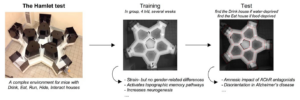
A figure from this paper. Image copyright Elsevier.
Topographical memory analyzed in mice using the Hamlet test, a novel complex maze
Published in Neurobiology of Learning and Memory.
Authors
Lucie Crouzier, Damien Gilabert, Mireille Rossel, Françoise Trousse, Tangui Maurice
Paper presented by Dr. Simon Couly and selected by the NIDA TDI Paper of the Month Committee
Publication Brief Description
The Hamlet test is a novel approach to study behavior in mice that have been trained to develop route learning strategies within a complex environment. This test can identify deficits in topographic memory and establishes a disorientation index for testing potential therapeutic drugs in pathological conditions associated with cognitive deficits. One of the assets of the Hamlet test is its reliance on a paradigm that uses spontaneous exploration rather than exploration based on positive and negative motivations. Indeed, a common issue with spatial behavioral tests is that animals may use strategies that rely on procedural routines or systematic avoidance behaviors rather than spatial memory. Although enriched environment paradigms have been used to make rodent housing more complex, these paradigms generally do not address topographic memory or long-term environmental training. Investigating topographic memory in familiar environments is crucial for enhancing guided navigation studies, improving the translational relevance of findings, and as the authors demonstrate in this report, modeling early warning signs of cognitive impairment (e.g. Alzheimer’s disease model).
Topographical memory analyzed in mice using the Hamlet test, a novel complex maze Journal Article
In: Neurobiol Learn Mem, vol. 149, pp. 118–134, 2018, ISSN: 1095-9564.
